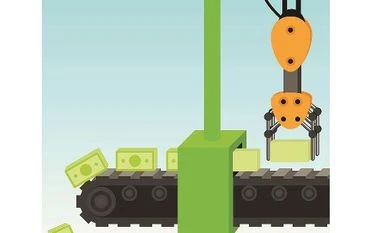Only half of the total value of the demonetised notes is likely to be supplied back into the system by the December 30 deadline and the cash crunch may be normalised only by end-February, says a report.
“Nearly 50 per cent and 75 per cent of the total value of the extinguished notes can be supplied by December-end and January-end respectively, given the current phase of frantic printing,” an SBI Research report said on Monday. At the end of February, 78-88 per cent of the notes could be back into the system under the best case scenario in terms of an optimal currency distribution, it added.
“It seems that within next two months things would be pretty close to normal. Interestingly, this number can go up to 98 per cent if we disregard the currency composition,” the report added.
When the government announced demonetisation of higher currency notes on November 8, there were 17.165 billion pieces of Rs 500 notes and 6.858 billion pieces of Rs 1,000 notes amounting to Rs 15.441 trillion (86 per cent of the value of the total amount of currency in circulation).
The Security Printing and Minting Corporation of India and Bharatiya Reserve Bank Note Mudran have been working at a frantic pace to replace the demonetised currency with new notes.
The RBI on December 10 had said it had supplied to the public 21.8 billion banknotes of various denominations worth Rs 4.61 trillion. Of this 20.1 billion pieces belonged to small denominations (of Rs 10, 20, 50 and 100s) and 1.7 billion notes belonged to higher denominations of Rs 2,000 and Rs 500.
In a previous statement on December 5, RBI had said the share of lower denomination notes was Rs 1.059 trillion with 19.1 billion bank-notes.
"This implies that during December 5 and December 10, as much as 1 billion notes were printed in small denomination, implying the total lower denomination currency is valued at Rs 1.159 trillion if we assume the additional notes were in Rs 100 denomination.
"Thus the value of high denomination notes comes out to Rs 3.451 trillion (Rs 4.610 trillion net of Rs 1.159 trillion)," the report said.
The RBI has said the combined number of pieces of high denomination are 1.7 billion.
"If we do a scenario analysis by assuming that the maximum number of such pieces is of Rs 500, then the gap between the corresponding value Rs 850 billion and actual value Rs 3,451 billion is maximum," it added.
“Nearly 50 per cent and 75 per cent of the total value of the extinguished notes can be supplied by December-end and January-end respectively, given the current phase of frantic printing,” an SBI Research report said on Monday. At the end of February, 78-88 per cent of the notes could be back into the system under the best case scenario in terms of an optimal currency distribution, it added.
“It seems that within next two months things would be pretty close to normal. Interestingly, this number can go up to 98 per cent if we disregard the currency composition,” the report added.
Also Read
The Security Printing and Minting Corporation of India and Bharatiya Reserve Bank Note Mudran have been working at a frantic pace to replace the demonetised currency with new notes.
The RBI on December 10 had said it had supplied to the public 21.8 billion banknotes of various denominations worth Rs 4.61 trillion. Of this 20.1 billion pieces belonged to small denominations (of Rs 10, 20, 50 and 100s) and 1.7 billion notes belonged to higher denominations of Rs 2,000 and Rs 500.
In a previous statement on December 5, RBI had said the share of lower denomination notes was Rs 1.059 trillion with 19.1 billion bank-notes.
"This implies that during December 5 and December 10, as much as 1 billion notes were printed in small denomination, implying the total lower denomination currency is valued at Rs 1.159 trillion if we assume the additional notes were in Rs 100 denomination.
"Thus the value of high denomination notes comes out to Rs 3.451 trillion (Rs 4.610 trillion net of Rs 1.159 trillion)," the report said.
The RBI has said the combined number of pieces of high denomination are 1.7 billion.
"If we do a scenario analysis by assuming that the maximum number of such pieces is of Rs 500, then the gap between the corresponding value Rs 850 billion and actual value Rs 3,451 billion is maximum," it added.
)